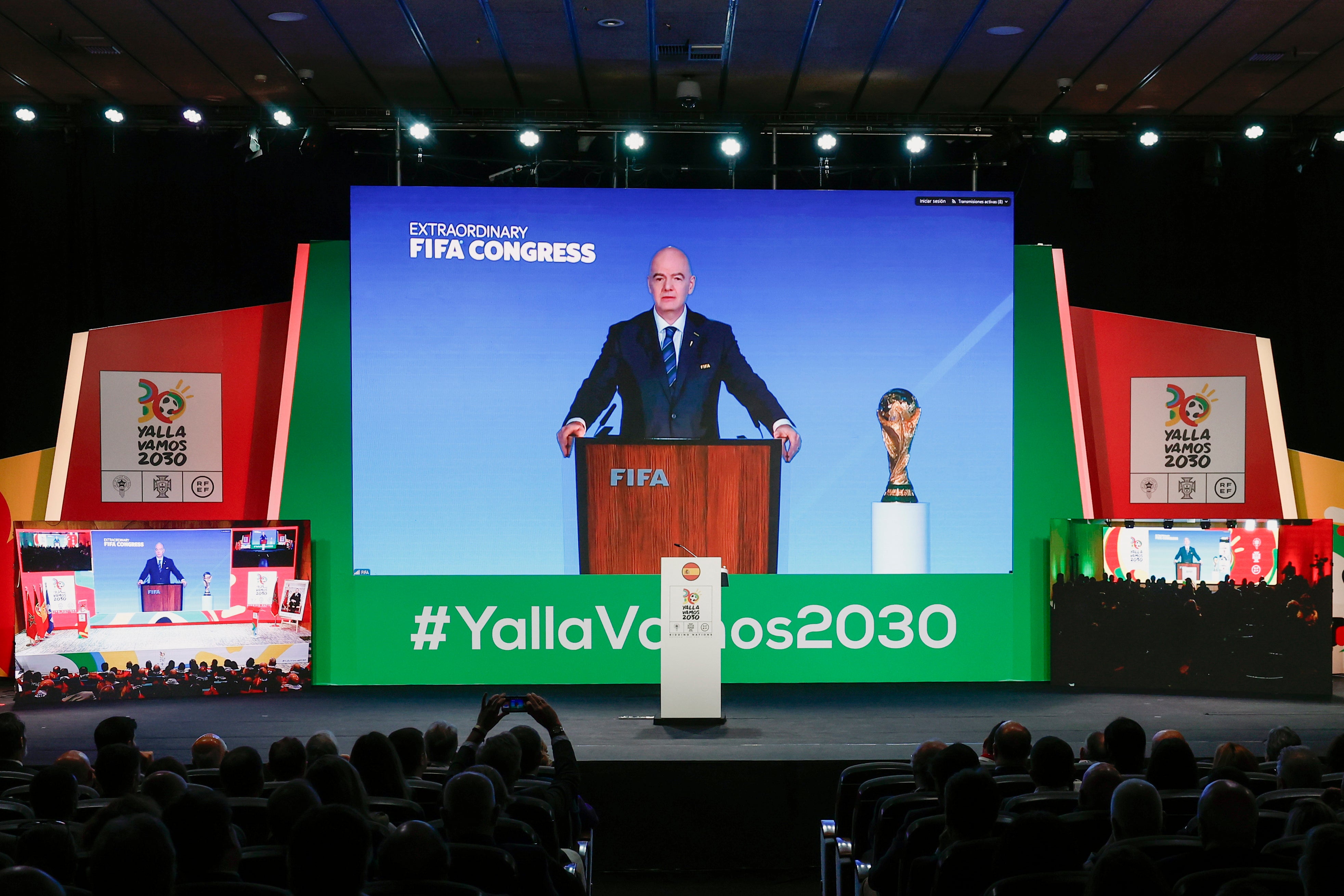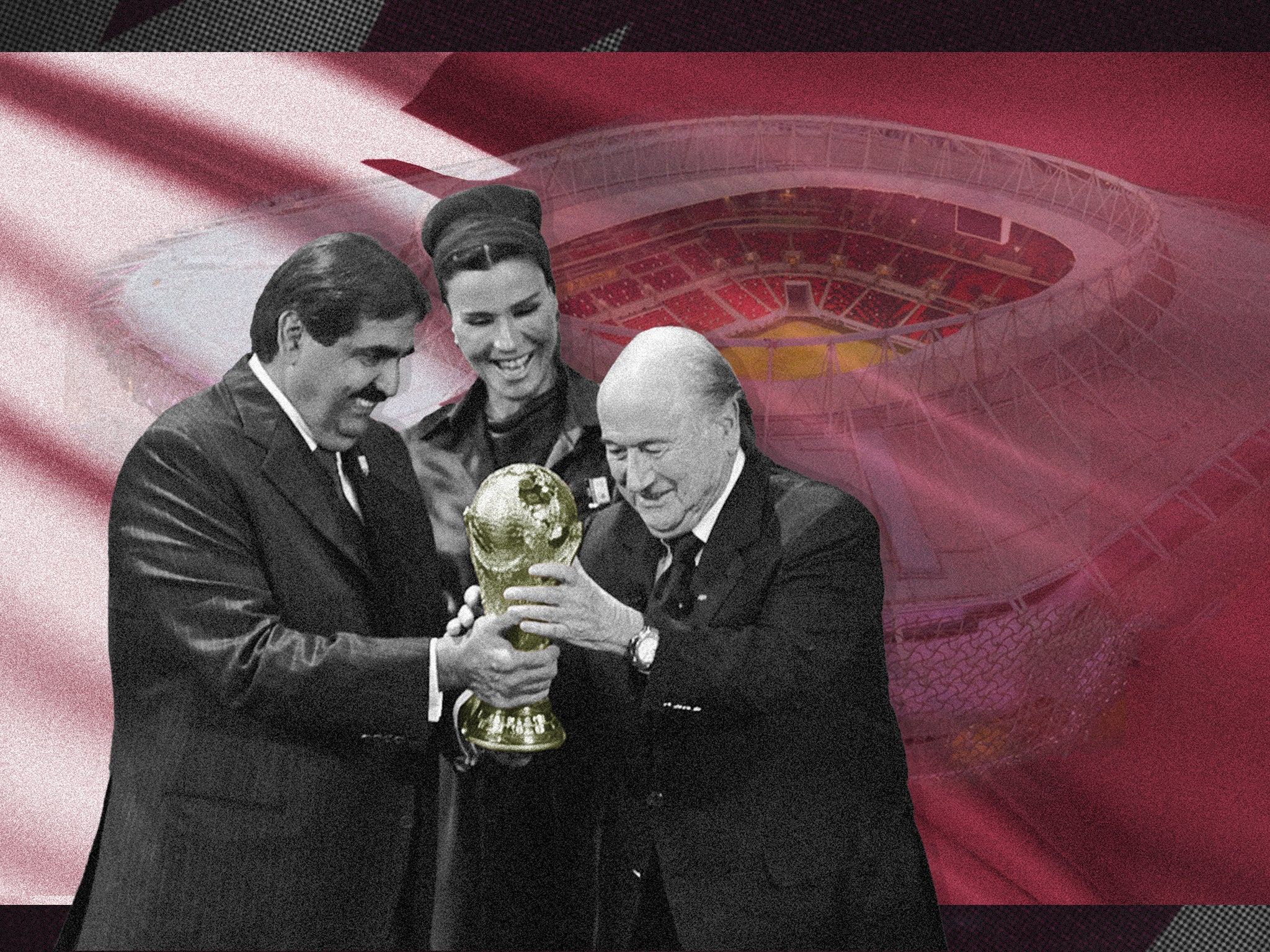The absurd image that sums up Fifa’s ‘tinpot dictatorship’ as Saudi Arabia awarded World Cup
The decision to hand Saudi Arabia the 2034 tournament was remotely applauded through by Fifa’s congress in ludicrous scenes and Miguel Delaney explains how this Gianni Infantino-led endeavour perfectly encapsulated the depths to which football has sunk


It was a scene that should become infamous, more absurd than anything even witnessed on 2 December 2010.
Fourteen years on, on Thursday 11 December 2024, Fifa’s congress remotely applauded through two “decisions” that acclaimed the hosts of the 2030 and 2034 World Cups: Morocco-Portugal-Spain with three matches in Argentina-Paraguay-Uruguay for 2030, and then Saudi Arabia for the tournament four years later. And that was only the half of it. The tinny applause came from a display of Big Brother-style screens, Fifa president Gianni Infantino standing proudly in front of it. It was an image that somehow represented a devolution from the shock on Sepp Blatter’s face as he read out “Qatar” on that day in 2010.

Infantino had asked the Congress members to raise their hands so that the acclamation was “near your head” and he would be able to see, before referring to the “scrutinies” also watching on. There were private quips from some involved about whether this would entail scrutinising how enthusiastically voters clapped. They didn’t sound rapturous. Some voters seemed to be in their cars. Others looked to be on their phone.
“Wonderful, wonderful!” Infantino declared.
It is incredible that this was the show put on for a federation of such power and a decision of such importance, but here we are. Here is the modern game.
If it wasn’t for this unique strangeness, you might otherwise have said it was like a “tinpot dictatorship”, a phrase people in football use to describe what confederations such as Fifa and Uefa have become. Even the fact this took place online precluded the possibility of huddled chats in corridors. Some of the members of the Fifa Council – the confederation’s highest body – didn’t even attend.
This is something worth acknowledging. Before you even get to the actual questions about the hosts, they have only arisen because of what Fifa has become. Infantino’s centrality to the event reflected how he is a Fifa president who is effectively an executive president, at the top of a political structure that is unjustifiably inexplicable given the “power” he said football has. That can be witnessed in events like this.

There was none of the shock of 2010, however, because this was seen coming over a year in advance. Every step taken for 14 months ensured that there was only one possible bid for 2030 and one possible bid for 2034. This has run alongside how almost every presidential election in football’s confederations since the 2015 Fifa overhaul has involved one candidate. There has been a declining democracy.
Such a structure here ensured that over 200 out of 211 national associations offered their support for both bids, which were conspicuously bundled together so federations had to applaud for both at the same time. The English FA felt it couldn’t go against 2034, for example, because that would have meant also going against the Uefa bid for 2030.

There were empty chairs in at least three of the images behind Infantino. The Norwegian federation was otherwise the only association to show any kind of moral backbone, demanding that their complaints about the process be read out. This was done in a perfunctory manner, with Fifa’s Mattias Grafström merely saying they would “revert” later.
That’s that sorted, then...
Everything else about this process had otherwise been sorted long beforehand.
As with the applause that replaced any kind of proper voting process, there was even the pretence of presentations, with both of the victorious bids showcasing their hosting as if there was anyone to actually persuade.
The 2030 video, perhaps suitably, was reminiscent of the “Mr DNA” sequence in Jurassic Park. There was even an early technical hitch, as Conmebol president Alejandro Dominguez couldn’t be heard in an address that was supposed to come before the presentation. Given the play that was then made of the World Cup’s centenary celebration of Uruguay 1930, it remains remarkable that South America was willing to accept a mere three matches at the cost of not hosting a tournament for at least 24 years after 2014.
The Saudi bid was inevitably prefaced by young children, some literally softer faces, in a way that has become customary in these kinds of bids. The presentation itself then emphasised the state’s “Vision 2030” programme, as well as constant reminders that it’s “a football nation” (it very much is) and talk of dancing and singing.
This is all just noise, though, even if it’s louder than the applause.
What is really significant now is what it means for football’s future, and what it says about its present and recent past.

The 2030 World Cup is going to happen as the warnings about climate change only escalate, and yet it will take place across three continents. Some of the matches in Spain and Morocco will almost certainly be staged in conditions close to 40 degrees, which should reframe some of the discussion about another winter World Cup. There will also be increased focus on Morocco over human rights issues, not to mention its migrant relationship with Spain, but particularly how same-sex sexual activity is illegal there.
Fifa has chosen another host that excludes some of football’s fanbase.
That is an issue that will reach a whole new level for 2034. It is going to see many of the same discussions as with Qatar but on a far greater scale, due to the greater scale of Saudi Arabia.
We will have a decade of human rights groups nobly raising concerns about oppression, civil rights, women’s rights, migrant workers’ rights and just human rights. “Without a shadow of doubt, workers will die,” Amnesty has already said. Not that we heard any of that here.
We will have a decade of talking about disruption to the calendar, given the heat will require another winter World Cup. It might even have to take place in January rather than November-December due to the timing of Ramadan and the Asian Games. The calendar is going to face even more chaos, although one wonders what that and the world will look like by then.
We won’t, however, hear any real resistance. That’s because, in some ways, the lessons of 2010 and Qatar have been learnt.

All of this has been normalised. There was no need for any of the backdoor issues of 2018-22 because everything is so brazen and in front of your face. Sports fans are used to support events in Saudi Arabia and other autocracies. Such money floods football, serving to co-opt many pillars of the game.
That helps this become inevitable and it is modern football distilled.
That did ensure there was some incongruity between the celebrated images of the simpler game of 1930 and everything else. Dominguez, finally capable of being heard after yet more technical hitches, spoke of things “money can’t buy”.
And yet that is precisely what has been appropriated; football as “social phenomenon”, as Infantino himself put it.
The Saudi presentation referred to “a historic moment”. It is, although perhaps not in the way intended.
Join our commenting forum
Join thought-provoking conversations, follow other Independent readers and see their replies
Comments


Bookmark popover
Removed from bookmarks